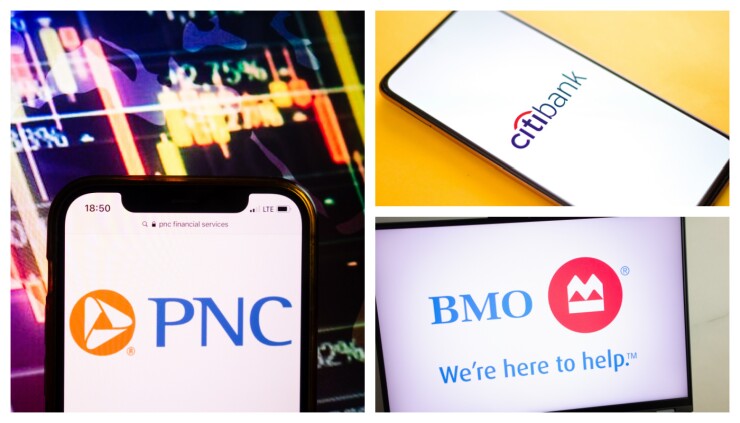
Three big banks are taking a page from the playbook of their online peers by paying attractive interest rates on digital savings accounts.
The rates are so high, in fact, that they top the offers from several online banks, which have few, if any, branch expenses. But there's a catch.
To snag BMO Financial Group's online savings account rate of 4.20%, customers must reside outside the bank's seven-state branch footprint.
It's a similar story at PNC Financial Services Group, which is offering interest rates of 4.00% for high-yield online savings accounts to customers outside of its branch network. And Citigroup is paying 3.85% on online savings accounts, as long as customers don't reside within its brick-and-mortar network.
The rates being offered are notable, particularly because most online banks haven't reached similar levels, said Ken Tumin, founder and editor of DepositAssounts.com, a website that tracks rates at more than 11,000 banks and credit unions.
"Even the more mature online banks haven't reached 4.00%," Tumin said. "So the fact that these banks have started offering it says they're really trying to attract deposits in an aggressive way."
In recent months,
In today's rising rate environment, competition for deposits has been ramping up, putting pressure on banks to attract new deposits and retain the ones they already have.
It's a stark change from a year ago, when banks were flush with liquidity. After the Federal Reserve began
Competitive pressure on deposit pricing is "the talk of the town," Andy Harmening, the CEO of Associated Banc-Corp in Green Bay, Wisconsin, said at an industry conference this week.
Associated is currently offering savings rates from 0.25% to 1.50%, depending on the type of savings account, according to the bank's website. Several of the bank's rates have ticked upward in recent months after nearly three years of running low, DepositAccounts.com data shows.
Not every bank has boosted its rates, and companies like BMO, PNC and Citi are taking advantage of the opportunity to scoop up new money, said Neil Stanley, CEO of The CorePoint, a consulting firm in Nebraska that helps banks price and sell savings deposits.
Banks that are paying high interest rates on online savings accounts may use the funds to invest in higher-paying securities or to make loans, Stanley said.
"These three banks are saying, 'Hey, let's go out of our footprint and take money from banks that are sleepy and bring it into our bank and make money,'" Stanley said. "And my sense is that this regional strategy will continue as long as the banks don't alienate their in-market clients."
BMO, which last boosted its online savings rate on Feb. 1, did not respond to requests to talk about its strategy.
BMO customers who live in Arizona, Illinois, Indiana, Kansas, Minnesota, Missouri and Wisconsin — all of which have BMO branches — are excluded from the deal.
Pittsburgh-based PNC declined to comment on its high-yield savings account.
In an email, a Citi spokesperson said that the bank's high-yield savings account is part of a "strategy to deepen and acquire client relationships" outside of its branch footprint by leveraging its brand and wealth management capabilities.
Citi launched the online savings account, Citi Accelerate Savings, in 2019. The New York megabank currently offers in-branch network customers several savings products, including high-yield certificates of deposit, some of which pay 4% or more.
As to whether more banks will follow the lead of BMO, PNC and Citi, Tumin said it's hard to say.
"They've built up so many deposits with low rates, and customers have stuck with them," Tumin said. "So I don't think they will move fast to offer high-yield accounts unless they really have to."






